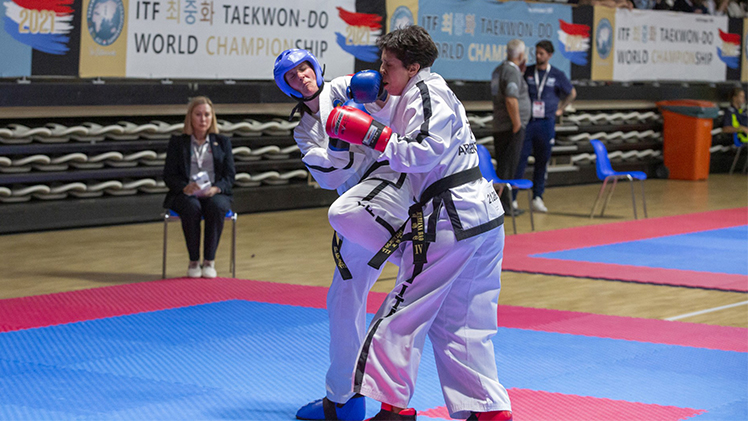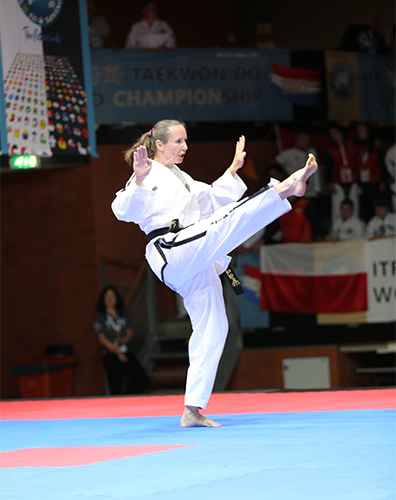If there were a UToledo community contest for the best answer to “How I spent my summer,” Dr. Cora Lind-Kovacs could claim the top prize.
In July, Lind-Kovacs, professor and associate chair in the Department of Chemistry and Biochemistry, represented Team USA at the 2022 International Taekwondo Federation World Championship in Amsterdam, medaling in both of her events.

Dr. Cora Lind-Kovacs, left, professor and associate chair in the Department of Chemistry and Biochemistry, represented Team USA at the 2022 International Taekwondo Federation World Championship in Amsterdam, medaling in both of her events. Photo courtesy of Rob Batenburg.
Lind-Kovacs took bronze in 4th Degree Senior Women’s Patterns Competition, in which she displayed her level of mastery of taekwondo in a solo performance, and silver in the Senior Women’s Heavyweight Sparring Competition, with full contact and both wearing protective gear. The “senior” category is for ages 36 and older.
“I’m definitely very happy with my success,” she said. “I have never competed in a world championship before now, and I haven’t competed at a high level since I had a serious knee injury in 2016. Being able to come back from that and compete at this level puts a smile on my face.”
“Cora’s performance earning gold medals at the North American Championships and USA Qualifiers in March was impressive, but then medaling again at the world championships was incredible,” said Dr. Jon Kirchhoff, Distinguished University Professor and chair of the UToledo Department of Chemistry and Biochemistry.
“All of UToledo should be proud that we have one of the best taekwondo athletes in the world on our campus! Her dedication to training after a serious knee injury a few years ago is inspirational to all of us to never give up reaching for our goals.”
After initially training in the traditional Japanese style of jujutsu, Lind-Kovacs took up taekwondo, a Korean martial art famous for its foot techniques, in the late 1990s while a graduate student at Georgia Tech.
“Taekwondo literally means the art of the hand and foot or the way of the hand and foot, depending on who translates,” she said. “The kicks and high kicks of taekwondo is what sets it apart from the other martial arts. It’s designed to be effective not just for big and tall people, but for people who are smaller and for women and children.”

Lind-Kovacs took bronze in 4th Degree Senior Women’s Patterns Competition, in which she displayed her level of mastery of taekwondo in a solo performance.
Lind-Kovacs joined the Department of Chemistry and Biochemistry in 2003 as a tenure track professor with a focus on Materials Chemistry and Crystallography. She teaches students at all levels, from freshmen in General Chemistry to specialized graduate classes in Advanced Materials Chemistry and Crystallography. In addition, she supervises a postdoc, graduate and undergraduate students in her research lab, where she explores low temperature routes to negative thermal expansion materials and the synthesis of model compounds to improve the performance of advanced lead batteries.
After settling in at the University, she looked for a martial arts school to continue her training in 2004, eventually achieving the level of fourth-degree black belt.
But then she injured her knee and needed physical therapy for her recovery.
“I am very grateful to my physical therapy team, because, without them, I would not have been able to get back to this level,” she said. “The head of my PT team, Tony Gwin, passed away in December from cancer. He had continued to give me advice and feedback long after I ‘graduated’ from PT, so I competed in his memory.”
She’s not finished, either. Lind-Kovacs, 47, said she plans to test for her fifth-degree black belt in taekwondo next year and to train for the next world championship, when she will be 50.
Lind-Kovacs said she wants to be a role model for her students to pursue their interests and passions.
“Some students have this impression about faculty, that once you become a professor your whole life is work,” she said. “But for students to see that faculty can still have hobbies and still dream; to go and win medals at the International Taekwondo Federation World Championship at age 47? I think that’s good for students to see. It allows them to look at their own lives differently, that, just because I take a job doesn’t mean there’s nothing else in my life at my age.”